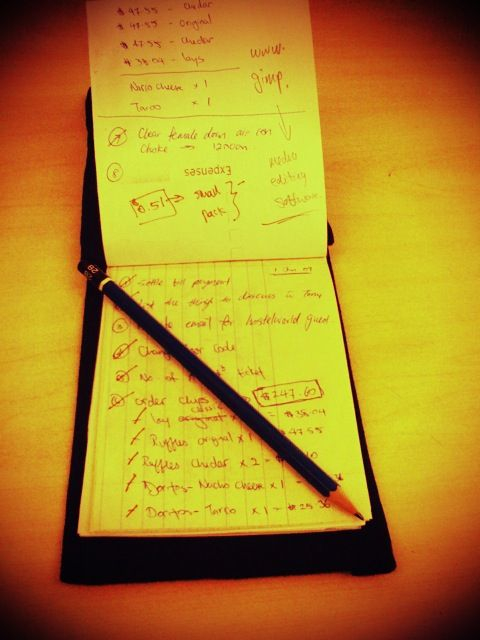I am a stickler for correct word usage. I shudder to hear someone say “Oriental” when they should say “Asian.” I am an evangelist for the eradication of the “r” word in any form, as it’s an insult to people with intellectual disabilities.

To-do list book. Image courtesy Justin See via Flickr Creative Commons.
And I’m well-aware that there is a standard repertoire of foolish remarks that people make to other people in given situations.
Here are some foolish things that people have said to me:
- “You published a book? Is anybody actually buying it?”
- (said when I was 8 months pregnant but not, according to a random stranger, ‘showing enough’) “Are they sure nothing’s wrong with the baby?”
- “Your kids have broken their legs how many times? Don’t tell that to me…I’m a mandated child abuse reporter, hahaha!” (my kids, like me, have a genetic disorder that causes them to fracture more easily than typical children.)
And here are some foolish things I have said to other people:
- “Isn’t it true that miscarriages usually happen because there’s something seriously wrong?” I said this to a friend who had recently miscarried. She forgave me.
- “Are these people CRAZY?” (in an email TO THE PERSON I WAS CALLING CRAZY in which I accidentally hit ‘reply’ instead of ‘forward’ so I could complain about them to my mom.)
- “Oh, I worry about dying all the time.” (said when I was a half-marathon-running 22 year old to my grandmother as she was actively dying of cancer in the hospital. It is a testament to her fabulousness that she found this hysterically funny.)
Yes, I am a stickler for the right words. Saying the ‘wrong’ thing to someone troubles me deeply, such that I can recall foolish things I’ve said more than a decade or two ago and still squirm with embarrassment over it, though I’m pretty sure no one else remembers at all.
But for all my logophilic tendencies, I have grown weary of late of the endless lists issuing directives on “things you should never say” to various groups and subgroups of people. And I find the policing of language that takes place in online forums is often very tedious: generating much more heat and anger than light and grace and understanding, which, I daresay, is what the gift of language is — or should be — all about.
All of us would do well to consider thoughtfully what we are about to say before we say it (or type before we type it.) Christianity and Judaism (I’m not qualified to speak about other religions, but I suspect most religions are similar in this respect) urge care in the use of words — the tongue is the rudder of the ship, the tiny ember that can set a forest aflame; yet words can also be a source of life, a fountain of flourishing.
Is it really admirable or edifying, though, to insist on lists of rules of what one must “never” say? Do these lists get at the heart of the matter — that all of us, in our words, should strive to “speak unto others as we’d like them to speak to us?” Do these lists leave room for grace?
I’m all for careful use of words. But I’m also an enormous fan of grace — grace for the speaker, and grace for the hearer.
{I’ve written a different, longer post on the same theme, together with some colleagues, on grace and ‘wrong’ words, at Christianity Today’s her.meneutics blog. You can read it here.}





